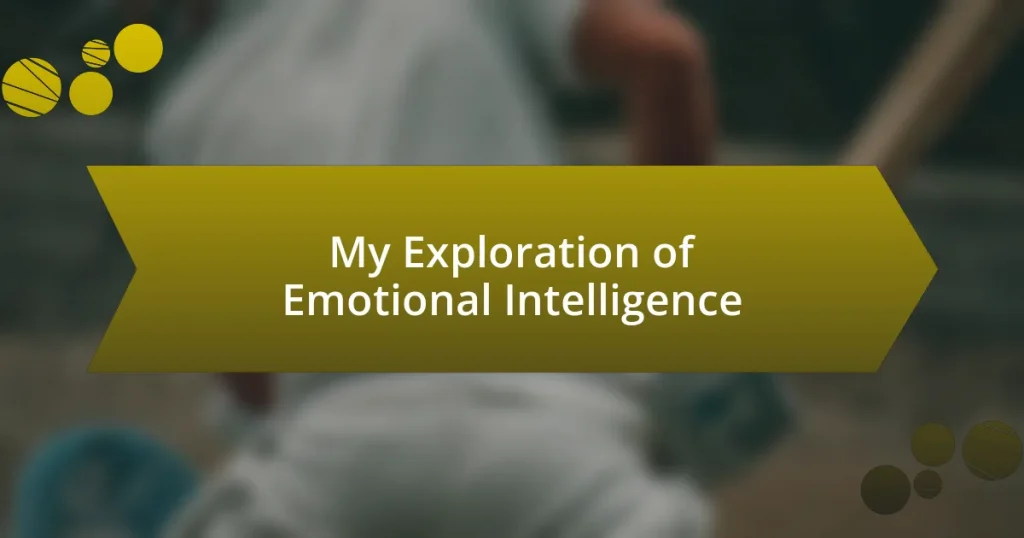Key takeaways:
- Emotional intelligence (EQ) involves recognizing and managing one’s emotions and understanding others’ feelings, contributing to better leadership and relationships.
- The key components of EQ include self-awareness, self-regulation, empathy, motivation, and social skills, which enhance interpersonal interactions.
- Assessing and developing emotional intelligence can be achieved through self-reflection, seeking feedback, practicing mindfulness, and active listening.
- Applying emotional intelligence in the workplace improves team dynamics, aids conflict resolution, and fosters a supportive environment through recognition of contributions.
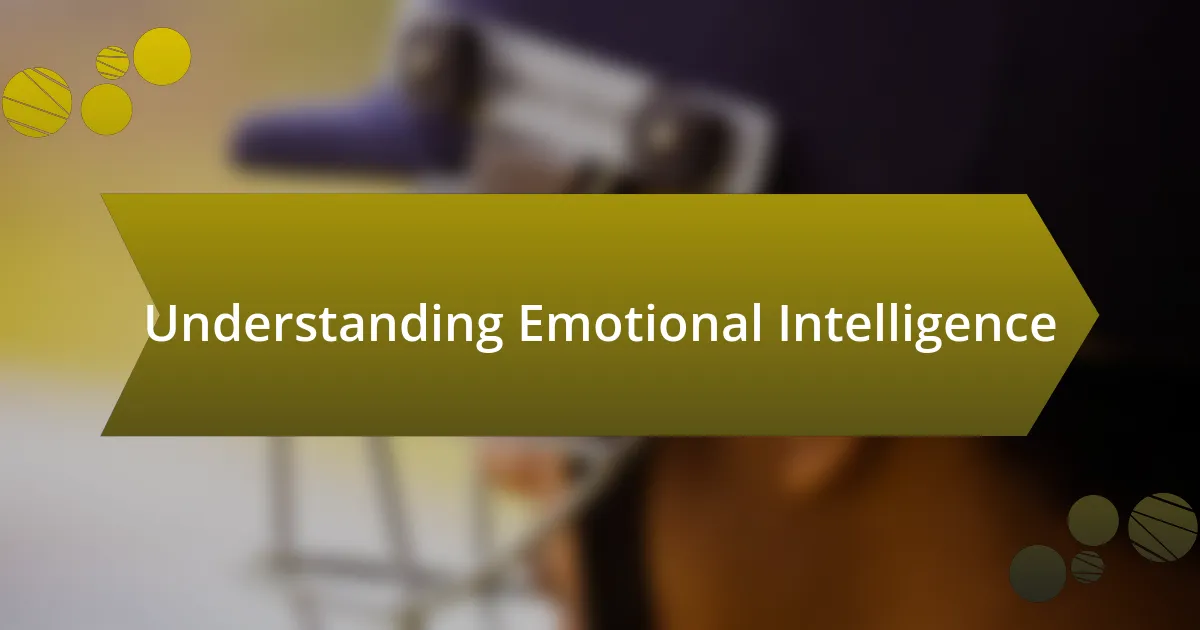
Understanding Emotional Intelligence
Emotional intelligence, often referred to as EQ, encompasses the ability to recognize, understand, and manage our own emotions while also being attuned to the feelings of others. I remember a time when I misjudged a friend’s disappointment, thinking it was just a bad day for them. That experience opened my eyes to the importance of empathy; understanding emotional cues can transform interactions and foster deeper connections.
When I reflect on my journey with emotional intelligence, I often ask myself why it’s so critical in today’s world. It seems to me that in both personal and professional settings, EQ is what differentiates a good leader from a great one. Leaders who possess emotional intelligence can navigate complex social situations and inspire those around them—something I’ve witnessed firsthand in my career.
Delving deeper into emotional intelligence also means recognizing its components: self-awareness, self-regulation, social awareness, and relationship management. For instance, during a particularly stressful project, I learned to pause and assess my feelings rather than react impulsively. This practice not only helped me to manage my own emotions but also allowed me to create a supportive environment for my team, demonstrating that our emotional states are interconnected.
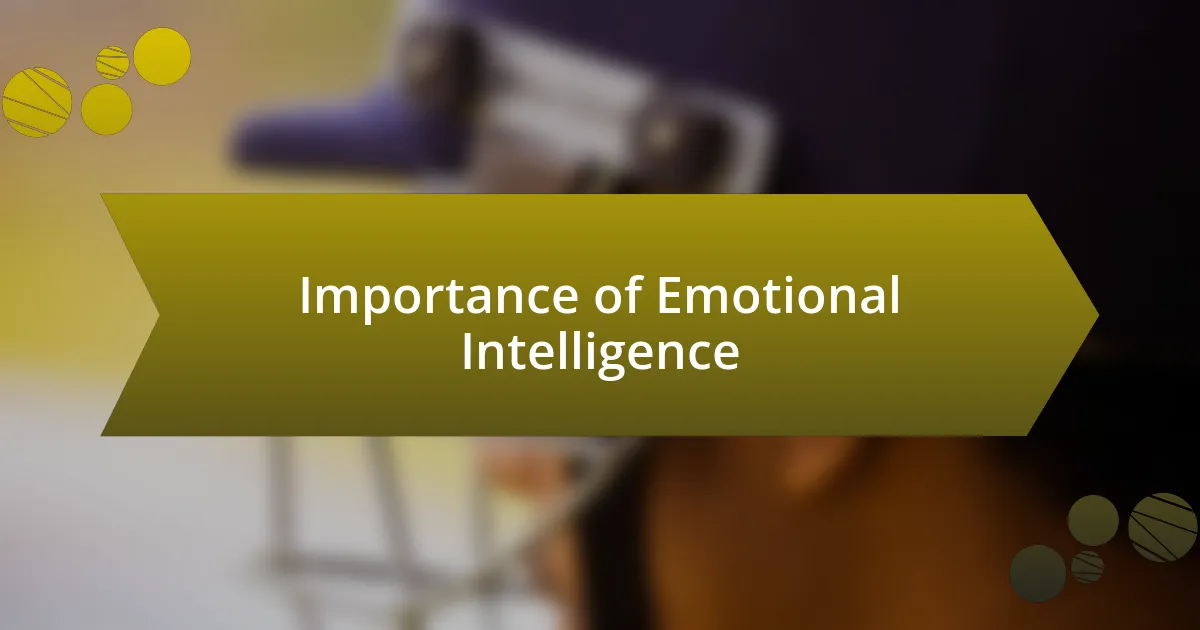
Importance of Emotional Intelligence
The significance of emotional intelligence cannot be overstated, particularly in a world that increasingly values interpersonal relationships and communication. I recall an instance where a misunderstanding at work could have escalated into conflict, but my ability to empathize allowed me to address the issue calmly and constructively. It reinforced my belief that being attuned to emotions—not just my own, but those of others—can lead to more positive and productive interactions.
Here are some key reasons why emotional intelligence is essential:
- Enhanced Communication: Understanding emotions fosters clearer and more effective conversations.
- Better Relationships: High EQ helps build trust and connection with others, creating stronger bonds.
- Conflict Resolution: Individuals with emotional intelligence are equipped to manage disagreements wisely and peacefully.
- Increased Empathy: Recognizing the emotional states of others enables deeper understanding and support.
- Improved Leadership: Emotionally intelligent leaders inspire and motivate, leading to more engaged teams and successful outcomes.
Through these experiences, I’ve come to appreciate that emotional intelligence not only enriches my personal relationships but also has a profound impact on my professional life. It’s a skill set that carries immense value, guiding us toward growth and connection in all areas of life.
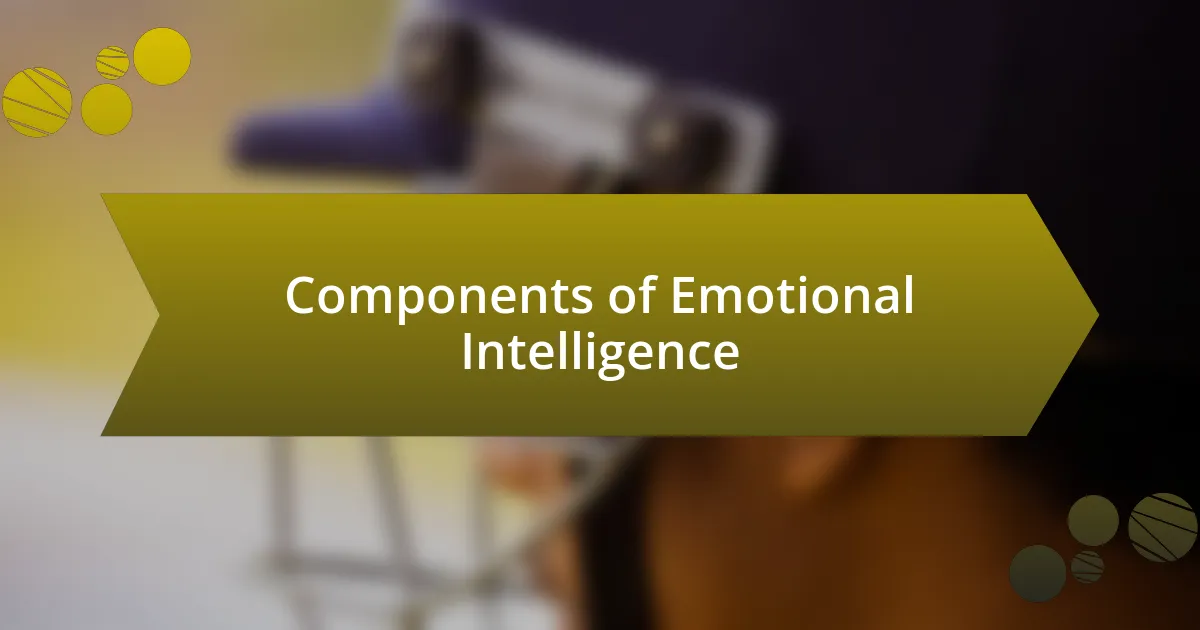
Components of Emotional Intelligence
Emotional intelligence consists of several key components that work together to help us navigate our feelings and the feelings of others. The three most widely recognized components are self-awareness, self-regulation, and social skills. For instance, I often catch myself reflecting on my emotions during stressful moments, which has helped me manage my reactions and make better choices in difficult situations.
Another vital element is empathy, which allows us to connect deeply with others by understanding their emotions. I remember a time when a friend was going through a tough phase, and my ability to feel what they were experiencing significantly strengthened our bond. This connection not only provided them with comfort but also reinforced my understanding of how powerful empathetic engagement can be in our relationships.
Finally, motivation plays a crucial role in emotional intelligence. It goes beyond mere goal-setting; it’s about harnessing emotional drive to inspire oneself and others. I often find a sense of fulfillment when I pursue my passions, and this intrinsic motivation helps fuel my enthusiasm in both personal and professional endeavors. These interconnected components create a richer emotional landscape, allowing for better interactions and a more profound understanding of the world around us.
| Component | Description |
|---|---|
| Self-Awareness | The ability to recognize and understand your own emotions. |
| Self-Regulation | The skill to manage and control your emotions effectively. |
| Empathy | The capacity to understand and share the feelings of others. |
| Motivation | The internal drive to pursue goals with energy and persistence. |
| Social Skills | The ability to build and maintain healthy relationships through effective communication. |
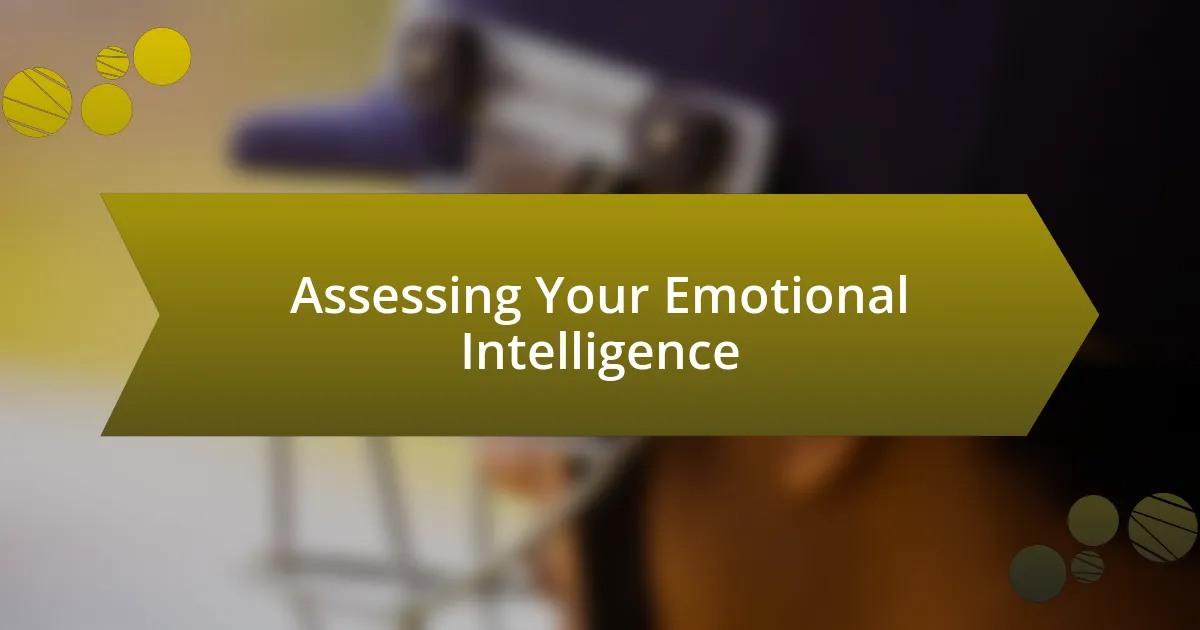
Assessing Your Emotional Intelligence
To assess your emotional intelligence, I find it useful to start with self-reflection. Think about a recent situation where you felt a strong emotion. How did you react, and what motivated that response? By analyzing these instances, we uncover patterns in our emotional behaviors, which is the first step in understanding our emotional landscape.
Another effective method I’ve used is seeking feedback from trusted friends or colleagues. Sometimes, we might be blinded by our own feelings. When I asked a close friend for their perspective on how I handle stress, their insights opened my eyes to areas I hadn’t recognized before. This kind of external perspective can be invaluable in assessing our emotional strengths and weaknesses.
Finally, there are numerous emotional intelligence assessments available online that offer structured insights. After completing one, I was surprised by the results; they highlighted aspects of my emotional intelligence I hadn’t fully acknowledged. These assessments can complement personal reflections and feedback, giving a clearer picture of where you stand emotionally and what areas might need growth.
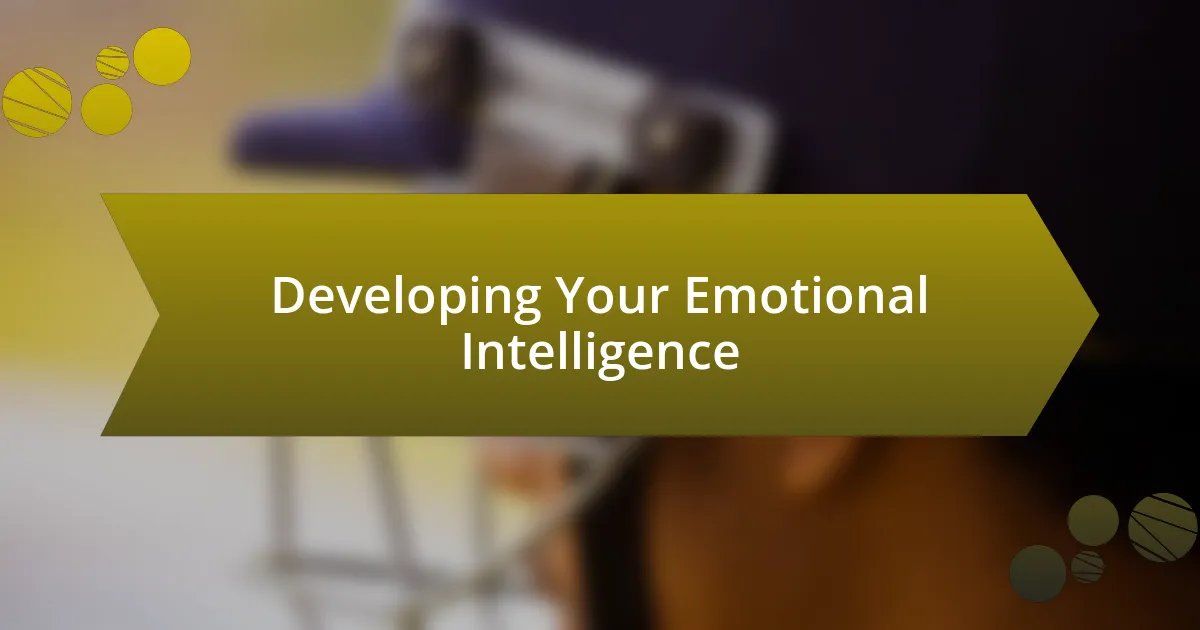
Developing Your Emotional Intelligence
Emotional intelligence is not a fixed trait; it’s something we can develop over time. One approach I’ve found particularly effective is practicing mindfulness. I remember a time when I was overwhelmed with stress at work. By taking a few minutes each day to focus on my breath and acknowledge my feelings without judgment, I started to respond to stressors more calmly. This practice has not only helped me manage my emotions but also improved my empathy towards others.
Another method that has proved invaluable is active listening. When I consciously make an effort to listen rather than just hear, I notice a significant shift in my interactions. For instance, during a team meeting, I practiced being fully present with my colleagues, giving them my undivided attention. The conversations became richer and more meaningful, and I found that my understanding of others’ feelings deepened.
Moreover, setting specific goals can also guide your emotional growth. For example, I once set a goal to express gratitude more often, aiming to acknowledge the little things people did for me. This not only improved my emotional awareness but also strengthened my relationships. Have you ever thought about how small changes, like expressing gratitude, could impact your emotional intelligence?
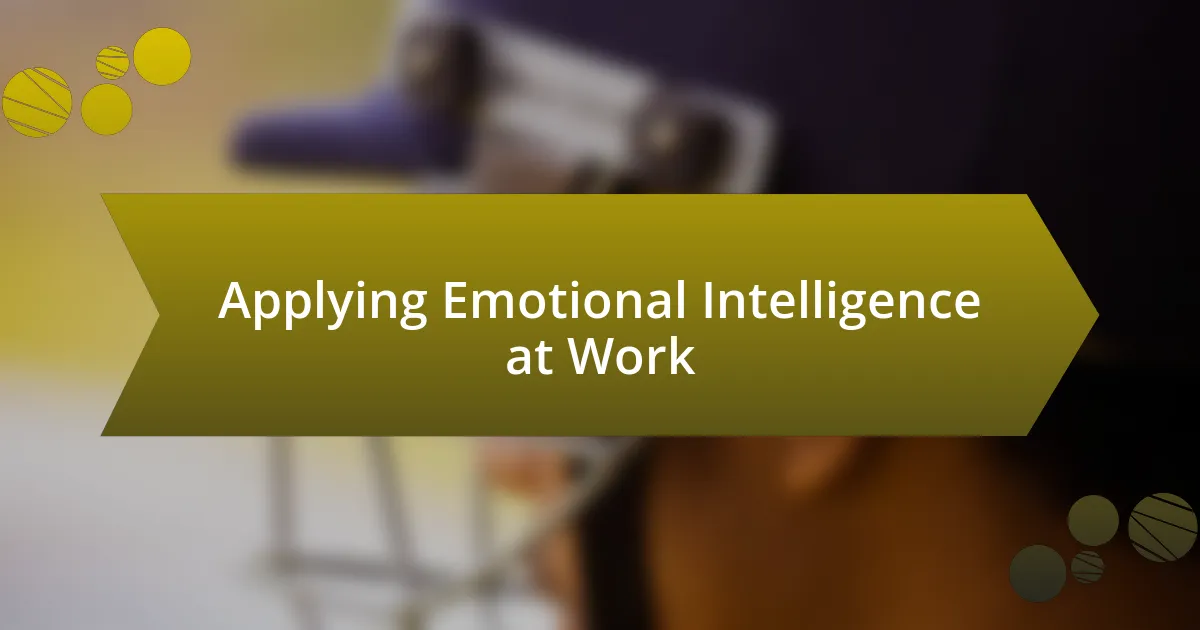
Applying Emotional Intelligence at Work
Navigating emotions in a workplace setting can truly enhance team dynamics. One day, I noticed a colleague who was visibly frustrated during a project discussion. Instead of ignoring the tension, I stepped in and asked how they were feeling about the task. It turned out, they felt unheard and overwhelmed, leading to a productive conversation that not only resolved the issue but also created a space for others to voice their concerns. Have you ever experienced a moment when acknowledging someone’s feelings changed the tone of the conversation?
Emotional intelligence also plays a pivotal role in conflict resolution. I recall a time when two team members had differing opinions on a project direction, creating friction. Instead of choosing sides, I facilitated a discussion where both could articulate their perspectives. This approach not only helped them find common ground but also reinforced the importance of understanding individual emotions in the workplace. Isn’t it fascinating how empathy can transform a conflict into collaboration?
Lastly, recognizing and celebrating emotions can significantly impact workplace morale. During team accomplishments, I’ve taken the initiative to highlight individual contributions, no matter how small. Once, I celebrated a team member’s late-night effort on a report during a team meeting, and I could see how much it lifted their spirits. Isn’t it incredible how simple acknowledgments can foster a supportive work environment?
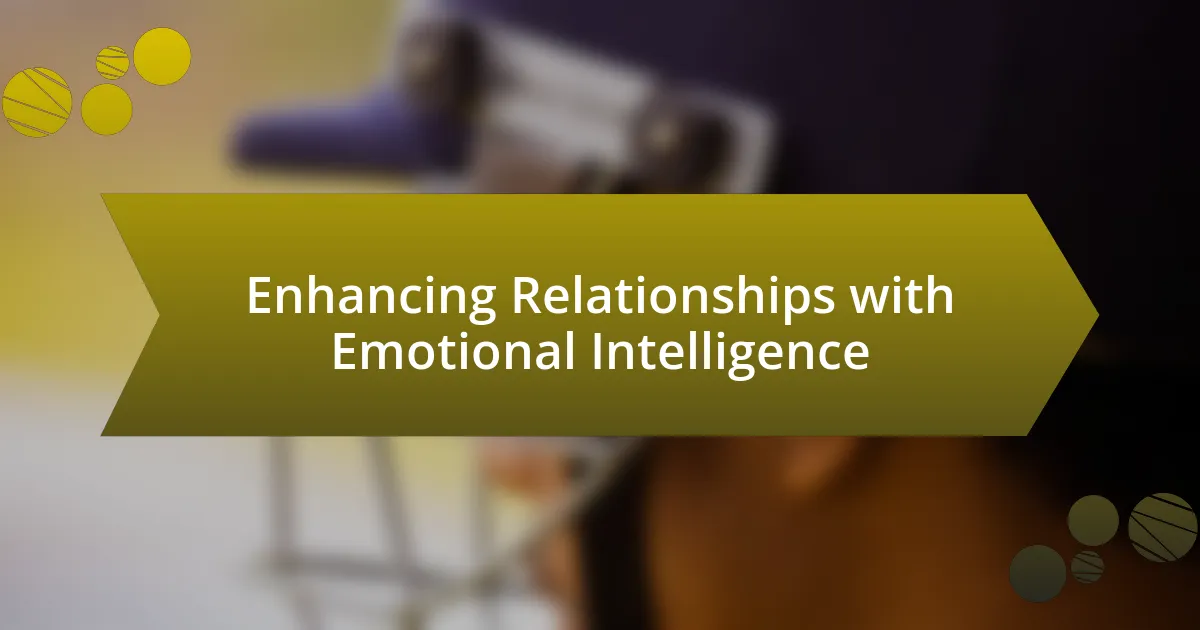
Enhancing Relationships with Emotional Intelligence
Emotional intelligence can profoundly enhance personal relationships by fostering genuine connections. I remember a time when a friend was going through a tough breakup. Instead of offering surface-level advice, I really tuned in to their emotions. I asked open-ended questions like, “How are you feeling about everything?” This simple act of empathy allowed them to open up, revealing deeper feelings they hadn’t expressed before. Have you ever noticed how a little attention to someone’s emotional state can strengthen your bond?
Effective communication is another cornerstone of relationships, bolstered by emotional intelligence. I once faced a misunderstanding with a close family member, which stemmed from a lack of clarity in our exchange. By taking a moment to reflect on my feelings and then sharing them vulnerably, I was able to create a safe space for them to do the same. Isn’t it amazing how transparency can turn a potential conflict into an opportunity for intimacy?
Additionally, being aware of non-verbal cues is crucial in nurturing relationships. I distinctly recall a time at a gathering where I sensed that a friend was withdrawn, despite their smile. By gently inquiring about what was on their mind, we uncovered feelings they felt pressured to hide. This experience reinforced my belief that paying attention to what remains unsaid can allow for a deeper understanding of someone’s emotional landscape. Have you ever caught a subtle signal that led to a deeper conversation?










